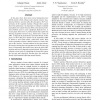Free Online Productivity Tools
i2Speak
i2Symbol
i2OCR
iTex2Img
iWeb2Print
iWeb2Shot
i2Type
iPdf2Split
iPdf2Merge
i2Bopomofo
i2Arabic
i2Style
i2Image
i2PDF
iLatex2Rtf
Sci2ools
101
Voted
HPCA
2005
IEEE
2005
IEEE
Heat Stroke: Power-Density-Based Denial of Service in SMT
In the past, there have been several denial-of-service (DOS) attacks which exhaust some shared resource (e.g., physical memory, process table, file descriptors, TCP connections) of the targeted machine. Though these attacks have been addressed, it is important to continue to identify and address new attacks because DOS is one of most prominent methods used to cause significant financial loss. A recent paper shows how to prevent attacks that exploit the sharing of pipeline resources (e.g., shared trace cache) in SMT to degrade the performance of normal threads. In this paper, we show that power density can be exploited in SMT to launch a novel DOS attack, called heat stroke. Heat stroke repeatedly accesses a shared resource to create a hot spot at the resource. Current solutions to hot spots inevitably involve slowing down the pipeline to let the hot spot cool down. Consequently, heat stroke slows down the entire SMT pipeline and severely degrades normal threads. We present a soluti...
| Added | 24 Jun 2010 |
| Updated | 24 Jun 2010 |
| Type | Conference |
| Year | 2005 |
| Where | HPCA |
| Authors | Jahangir Hasan, Ankit Jalote, T. N. Vijaykumar, Carla E. Brodley |
Comments (0)

